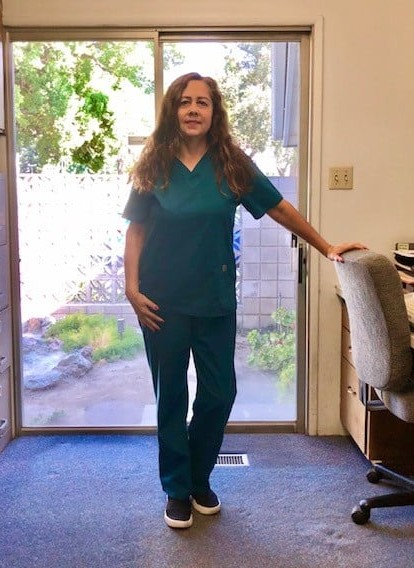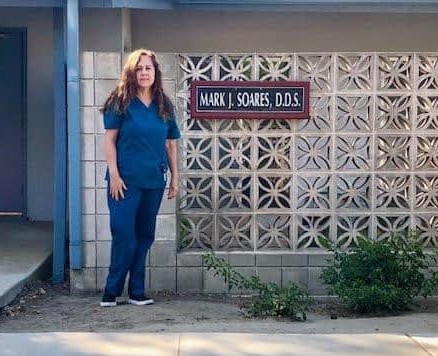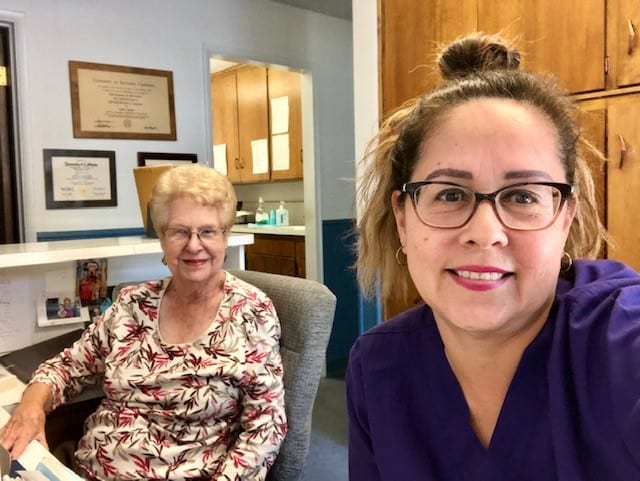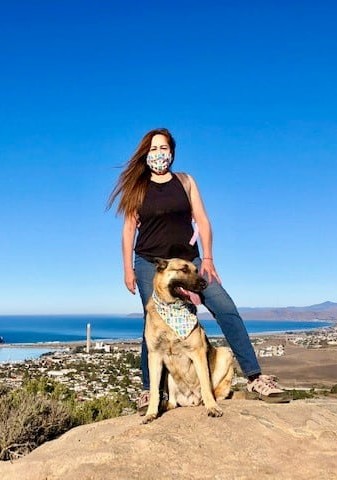Grad Q&A with Dental Assistant of 35-years Gloria Mejorado
 As one of the first students to graduate from SJVC’s Dental Assisting program on the Fresno campus 35-years ago, Gloria Mejorado has a lot to share about the professionalism and longevity her education and training provided, as well as what has – and has not – changed in patient care.
As one of the first students to graduate from SJVC’s Dental Assisting program on the Fresno campus 35-years ago, Gloria Mejorado has a lot to share about the professionalism and longevity her education and training provided, as well as what has – and has not – changed in patient care.
What made you choose a career as a Dental Assistant?
I packed oranges at a packing house for 7-years before I decided, ‘This is not for me’. My daughter, Amanda, was just 4-years old and I needed something stable, something for the future. I decided to go to school. A friend went through the Clinical Medical Assisting program at SJVC and she told me she enjoyed it.
They (SJVC) gave me the tour, and I was convinced I wouldn’t have to go anywhere else.
What was your experience like in the Dental Assisting program?
We didn’t have patient interaction back then, we only had mannequins and each other to practice on and take x-rays. My instructor, Martha Badaracco, had a big influence on me and how she taught really stuck with me, even up to this day. We (students) got close, and we could study together. To this day I still talk to two of them.
Did you struggle to stay in the Dental Assisting program?
When I first started, I was married to my daughter’s dad, so he was there to help me get through this. But with Amanda being so small, dropping out was still a possibility. She was also my inspiration to keep going. I thought, ‘I can’t quit; I have to do this for her’.
And I knew my daughter was in the best care with my mom, Gloria. She was a big support system for me in a lot of ways. Amanda learned a lot from her too, like cooking and bilingual skills.
 Did you find a job soon after completing your Dental Assisting program?
Did you find a job soon after completing your Dental Assisting program?
I started my externship (Dental Assisting hands-on experience) with a dentist in Reedley at the same time Dr. Soares started his practice there (in the same building). I ended up working for Dr. Soares, so now I’ve had the same office, same boss, same parking spot for all these years.
What do you enjoy most about being a Dental Assistant?
I can tell you a little something about every single patient who walks into my office. They’re no longer a patient, they have become a friend. It’s the same with Dr. Soares. He might take an extra 15-minutes for this patient because they like to chat. We anticipate that interaction and make time for it. We know every patient’s personality.
And you want to help each of them relax. With our patients, there’s always interaction. I don’t just put them in their chair. I ask, ‘How are your children, how’s your dog?’ Most are long-term relationships.
To help them calm down I review what we’re going to be doing. Once in a while someone might say, ‘Don’t tell me what you’re going to do, just do it!’ Every patient is different. We have a history, so after so many years, you create a bond with them.
We have three generations of patients and when some move away they will still come back when they visit their parents.
Has a lot changed in Dental Assisting technology and the dentist office since you graduated 35-years ago?
When I first started working, there were no gloves used, except maybe by the dentist. There were no Dental Hygienists; the dentists performed cleanings.
We didn’t have computers or implants (tooth screwed into bone) when I started. We would do a partial (denture) when teeth were missing, or we would extract their teeth for patients to get a full denture. X-rays are done differently now. They’re on computer instead of film.
 How did your first role and responsibilities change?
How did your first role and responsibilities change?
After years of ‘back office’ responsibilities, I started learning the ‘front office’. I learned a lot, not only about work, but life in general from Carol (Dr. Soares’ mom who ran the front office). We had a strong bond and relationship, and she was not treated any different than I was. At 83 she still didn’t want to retire, but finally did last year because of Covid.
We slowed down, then were closed for two months, so I felt I could do both (front/back office) jobs. Even when we stopped seeing patients, I would still go in and answer the phone. Patients were still calling, and mail was still coming in.
How did Covid change office protocol once you reopened?
We used to have a treasure box for years and watching kids get into that box was the best. ‘If you do good (in the chair), you can go into the treasure box,’ I would tell them. Sometimes choosing something from that little box took longer than their procedure. There were kids who started at age 5 and are now in college that still asked to get something out of the Treasure Box. Because of Covid we had to take that away.
And, we still have to take temperatures as soon as a patient walks in, for Covid screening purposes.
Who has been your example to push through difficult times?
I came from a family of six girls and two boys and watching my mother raise those kids I thought, ‘How did this woman do that?’ She was quietly strong, the one who held the family together. She’s been gone for 16-years but always showed her love through home-cooked meals and her family values.
She would always tell me, ‘Don’t worry; just do what you have to do.’ I look back and say, ‘This is where I got my strength.’
What would you say to others who might struggle with the decision to pursue their career ambitions through specialized education?
Whoever is positive around you, find that support system. Surround yourself with those people – friends, neighbors, teachers. If you’re around the right people, you can get by.
I’ve learned how to be a strong, independent woman – and it started right there (at SJVC). I had hard decisions about my education and about life. To me, the most important things toward that life are family, education, a house and your car. If you have those, you can move forward to whatever you want to do.
What keeps you operating in high gear?
I’m up in the morning, ready to go. I get the back office started at 7:30 AM and then the front office ready for the first patient at 9:00 o’clock. I enjoy knowing exactly what is expected and that we are capable and ready.
At the end of the day, I come home to take care of my blind and diabetic German Shepherd, Chico. In these 35-years I have hosted 9-exchange students (one boy twice), one foster daughter for 8-months and a foster son for 5-years. I help rescue and foster dogs, too. I guess you can say I am a nurturing person and I do see a reflection of my mother in me.
I just turned sixty and won’t retire until I’m sixty-six. But I’m not thinking about retiring yet. If this office closes down, I want it to be known that “Gloria comes with the building!”
Read Our Career Guide On Dental Assisting in California.
Dental assistants perform a variety of patient care and administrative duties. They take x-rays, schedule patient appointments and assist dentists during dental procedures.
You might also like
More stories about
Request Information
All fields using an asterik (*) are required.



